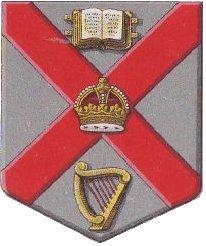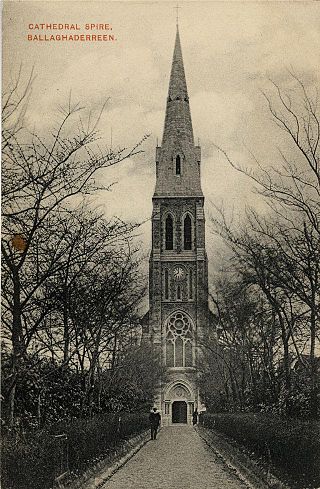
The Tribes of Galway were 14 merchant families who dominated the political, commercial and social life of the city of Galway in western Ireland between the mid-13th and late 19th centuries. They were the families of Athy, Blake, Bodkin, Browne, Darcy/D’Arcy, Deane, Font, French, Joyce, Kirwan, Lynch, Martyn, Morris and Skerritt. Of the 14 families, 12 were of Anglo Norman origin, while two—the Darcy and Kirwan families—were Normanised Irish Gaels.

Michael Morris, 3rd Baron Killanin, was an Irish journalist, author, sports official, and the sixth President of the International Olympic Committee (IOC). He succeeded his uncle as Baron Killanin in the Peerage of the United Kingdom in 1927, when he was 12, which allowed him to sit in the House of Lords at the Palace of Westminster as Lord Killanin upon turning 21.
Thomas Barnwall Martin was an Irish landowner and politician.

The Queen's University of Ireland was established formally by royal charter on 3 September 1850, as the degree-awarding university of the Queen's Colleges of Belfast, Cork, and Galway that were established in 1845 "to afford a university education to members of all religious denominations" in Ireland.
Joseph William Kirwan was an Irish clergyman and educationalist, who served as the first president of Queen's College Galway.
Edward Berwick (1804-1877) was an Irish lawyer and educationalist, and served as President of Queen's College Galway from 1849 until 1877.
William Crolly was the Bishop of Down and Connor from 1825 to 1835, and the Roman Catholic Archbishop of Armagh from 1835 to 1849.
Ardclough, officially Ardclogh, is a village and community in the parish of Kill, County Kildare, Ireland. It is two miles (3 km) off the N7 national primary road. It is the burial place and probable birthplace of Arthur Guinness, who is said to have returned to the maternal homestead of the Reads at Huttonread to give birth in the tradition of the time.

The Roman Catholic Diocese of Galway, Kilmacduagh and Kilfenora is a Roman Catholic diocese in the west of Ireland. It is in the ecclesiastical province of Tuam and is subject to the Metropolitan Archdiocese of Tuam. The deanery of Kilfenora, previously a diocese in its own right, lies in the ecclesiastical province of Cashel. The ordinary is Bishop Michael Duignan who was appointed on 11 February 2022.

The Roman Catholic Diocese of Achonry is a Roman Catholic diocese in the western part of Ireland. It is one of the five suffragan sees of the Archdiocese of Tuam. The diocese was often called the "bishopric of Luighne" in the Irish annals. It was not established at the Synod of Rathbreasail, but Máel Ruanaid Ua Ruadáin signed as "bishop of Luighne" at the Synod of Kells.

The Diocese of Killala is a Roman Catholic diocese in Connacht; the western province of Ireland. It is in the Metropolitan Province of Tuam and is subject to the Metropolitan Archdiocese of Tuam. As of 2023, the bishop is Dr. John Fleming DD who was appointed on 7 April 2002.
Cornelius Denvir (1791–1866) was an Irish Roman Catholic prelate, mathematician, natural philosopher and former Lord Bishop of Down and Connor. He is noted for ministering in Belfast amidst growing sectarian tension, taking a moderate and non-confrontational stance, to the annoyance of his pro-Catholic followers. He was also a professor at Maynooth College as well as Down and Connor Diocesan College, and was active in the local scientific community.
Rev Andrew Martyn (1785–1847) was an Irish Roman Catholic priest and activist. He was a staunch supporter of the Repeal Association.

The Ashfield Gales consisted of six generations of a Gale family who owned the Ashfield estate in Killabban Parish, Queens County, Ireland from the mid-17th Century until 1851.
William Ó Ciardhubháin, fl. 1488, was an Irish merchant and the founder of one of the Tribes of Galway.

Maurice Francis Burke was an Irish-born prelate of the Roman Catholic Church. He served as bishop of the Diocese of Cheyenne in Wyoming (1887–1893) and as bishop of the Diocese of Saint Joseph in Missouri (1893–1923).
George Joseph Plunket Browne (1795–1858) was an Irish Roman Catholic clergyman. Born to a "well-known Roscommon family", he served as Bishop of Galway from 1831 until 1844, and afterward as Bishop of Elphin, until his death on 1 December 1858. He was charged with being a "Cullenite" in 1855, that is, a follower of ultramontane Paul Cardinal Cullen.
Walter Blake Kirwan (1754–1805) was an Irish priest of the Church of Ireland and a noted preacher.
Laurence O'Donnell DD was a Roman Catholic Bishop of Galway, starting in 1844; he was appointed September 26, and consecrated October 28.
Oughterard GAA is a Gaelic football club based in Oughterard, County Galway, Ireland. The Gaelic Athletic Association club is a member of the Galway GAA. Oughterard had a hurling team in the 1920s but is primarily and always has been a Gaelic football club and teams compete from the groups of under 6 to Senior.







